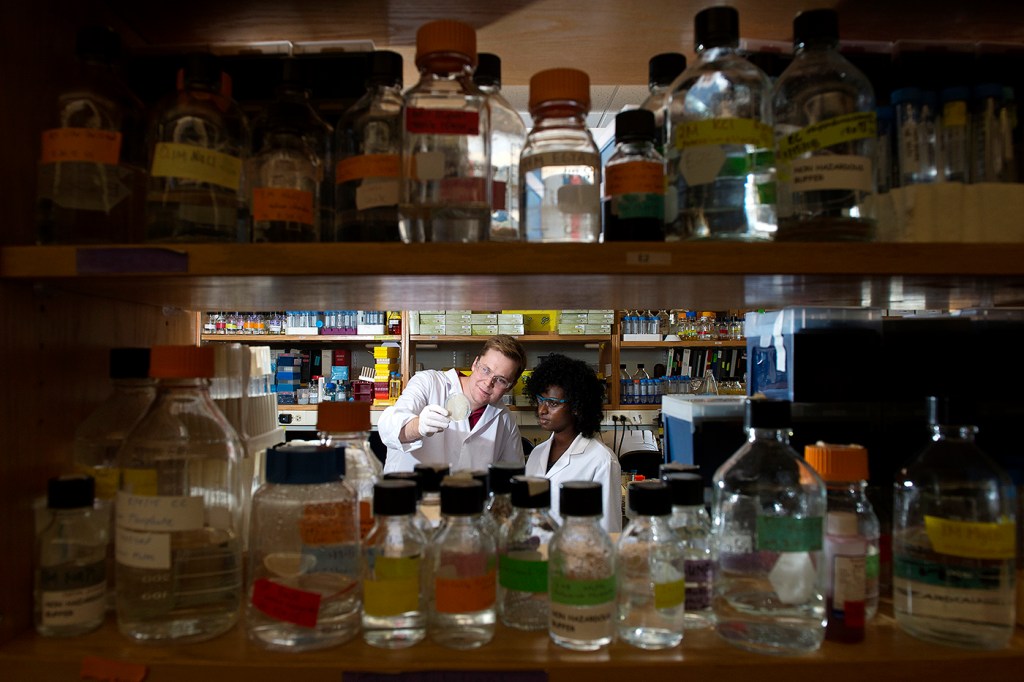New $4.4M National Science Foundation grant supports minorities in fast-track biotechnology program

Northeastern University President Joseph E. Aoun and Massachusetts Governor Charlie Baker will announce Tuesday that a program developed by Northeastern and Middlesex Community College to offer students a fast track to earning associate, bachelor’s, and master’s degrees in biotechnology and preparing for careers in life sciences has received a $4.4 million grant from the National Science Foundation. The grant will fund scholarships that support low-income and underrepresented minorities—a critical focus for industry, government, and higher education institutions as they work together to increase the number of students in the STEM fields of science, technology, engineering, and math.
“Students who are able to take advantage of this associate to master’s opportunity will be prepared for success in the region’s biotech industry through paid internships, research experience, and other career opportunities,” said Governor Baker. “The partnership between Northeastern University and Middlesex Community College is an exciting and creative way to provide students an affordable path to a degree.”
The federal grant will fund approximately 530 scholarships of up to $10,000 per year per student in the Biotech Associate to Master’s program. The scholarships, when combined with federal financial aid and other assistance, will completely cover or significantly reduce students’ out-of-pocket tuition costs. It will also prepare students for the region’s biotechnology job market by providing them with research experiences, paid internships, mentorship, and academic and career advising.
France A. Córdova, director of the National Science Foundation, spoke at the official opening of Northeastern’s Interdisciplinary Science and Engineering Complex last year, where she praised Northeastern for sharing an interest in breaking down barriers between disciplines, fostering new collaborations aimed at solving great societal challenges, and educating the next generation of scientists and engineers.
“At Northeastern, we are committed to meeting learners wherever they are in their educational journey,” Northeastern President Joseph E. Aoun said. “This includes creating innovative pathways for adult learners of all backgrounds to pursue careers in biotechnology. I want to thank Governor Baker, Dr. Córdova, and President Mabry for their vision and their leadership. By joining forces, we are providing valuable educational opportunities and renewing a fundamental social compact.”
In addition to Northeastern’s global network of employer partners, Northeastern and Middlesex Community College have formed partnerships with biotech companies and organizations to provide scholarship recipients with these resources and help tailor the program to the specific workforce needs in the biotech industry.
President Aoun and Governor Baker will formally announce the grant Tuesday afternoon at Northeastern’s Interdisciplinary Science and Engineering Complex. Other speakers will include Lt. Gov. Karyn Polito, Congressman Joseph P. Kennedy III., Middlesex Community College President James Mabry, and Dr. Jeffrey Leiden, chairman, president, and chief operating officer of Vertex Pharmaceuticals.
The announcement comes as Massachusetts marks its inaugural STEM Week, which is focused on boosting students’ interest in education and careers in the STEM fields.
Students who are able to take advantage of this associate to master’s opportunity will be prepared for success in the region’s biotech industry through paid internships, research experience, and other career opportunities. The partnership between Northeastern University and Middlesex Community College is an exciting and creative way to provide students an affordable path to a degree.
Charlie Baker, Massachusetts governor
Massachusetts’ life sciences industry is expected to add nearly 12,000 more new jobs by May 2023, according to a report released earlier this year by the Massachusetts Biotechnology Education Foundation. The job market is increasingly in need of workers with the degrees and skills to fill these positions. The report found that the pace of growth in entry-level positions since 2010 has outpaced the growth of graduates from industry-related programs.
There is also a need for greater diversity in jobs in science, technology, engineering, and math. According to the U.S. Department of Commerce, women represented 47 percent of the country’s total workforce in 2015 but held only 24 percent of jobs in the STEM fields. Black and Hispanic workers also continue to be underrepresented in the STEM workforce, according to the Pew Research Institute; among employed adults with a bachelor’s degree or higher, black and Hispanic workers hold 7 percent and 6 percent of STEM jobs, respectively.
The Biotech Associate to Master’s program builds upon Northeastern’s efforts to make college accessible and inclusive for low-income and underrepresented minority students, develop flexible academic programs that meet students’ needs and allow them to be lifelong learners, and broaden opportunities for students to pursue degrees and careers in the fields of science, technology, engineering and math.
The representation of women in many of Northeastern’s STEM-focused programs is above the national average. In the College of Science, 66 percent of undergraduate and 50 percent of graduate students are women, while the total enrollment of female students in the College of Engineering is at 32 percent compared to the national average of 21 percent.
As for the university’s biology and biotechnology bachelor’s degree programs that will benefit from the new funding, women represent more than half of the student population while underrepresented minorities and low income populations are at 48 percent and 60 percent, respectively. The grant from the NSF will help increase these numbers significantly.
Northeastern’s ALIGN program, which offers a master’s degree in computer science for non-computer science majors, is another example of the university’s commitment to helping lifelong learners expand their skill sets and to making information technology and computer science careers accessible to diverse populations of learners, including women and underrepresented minorities. Last month, the university also announced a partnership with Google in which people who complete Google’s IT Support Professional Certificate can now receive credit toward a bachelor’s degree in information technology.

The new grant will also defray students’ out-of-pocket costs by providing free textbook and laptop loan programs, stipends for academic tutoring, and assistance with parking and public transportation passes. In addition, it will fund a new staff position at Northeastern to support scholarship recipients throughout the program.
A gift from the Herb and Maxine Jacobs Foundation will further reduce the costs for students by helping cover the remaining tuition costs for the master’s program.
The grant also includes a research component. A team led by faculty at Northeastern will study how much the pathway program increases students’ success in obtaining STEM degrees and preparing for their careers.
Through the program, students earn an associate’s degree in Middlesex Community College’s Biotechnology Technician program. Next, they can transfer their college credit and matriculate into the bachelor’s completion program in biotechnology in the College of Professional Studies at Northeastern. Then, while still in their undergraduate program, students can apply to the “PlusOne” biotechnology master’s program, in which they can take four graduate-level courses in the College of Science at undergraduate tuition rates.
Northeastern student Tayaba Naz, one of the first two students awarded scholarships through the program, graduated from Middlesex Community College with her associate degree in biotechnology in the spring of 2017. She matriculated to the Northeastern biotechnology bachelor’s program last fall, and in January, started her master’s program.
Naz said being a graduate student helped her land a research internship at MilliporeSigma, a life sciences company based in Burlington, Massachusetts. Following her three-month internship this past summer, MilliporeSigma offered her a new job on the communications team.
She said the program offers many benefits to students, including significant savings on tuition, experience, mentorship, and connections in the biotech industry. “This [program] will differentiate them from many other candidates who come into the field,” Naz said.
The scholarships are available to full-time students in good academic standing who are eligible for federal Pell Grants, and who are U.S. citizens, legal permanent residents, or have been granted refugee status in the United States. While the accelerated pathway program is designed for students to earn all three degrees, students can apply for scholarships at any point while enrolled in one of the three degree programs.
Northeastern will stream Tuesday’s event live on its Facebook page.